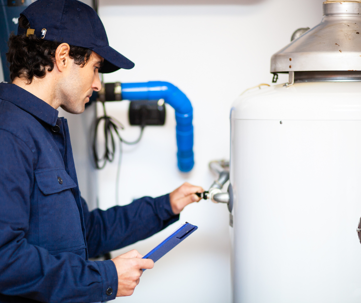Will a Leaking Water Heater Explode?
A leaking water heater might seem like a minor inconvenience, but the risks it presents can escalate to dangerous levels, including the rare but real possibility of a hot water heater explosion. So will a water heater explode? That is a possibility!
By understanding the warning signs and taking proper precautions, you can protect your plumbing system and the safety of your home. Let’s explore the dangers of a leaking water heater, the main causes, and the best preventative measures to keep your system running safely with Complete Plumbing and Drain.
Understanding the Risks of a Leaking Water Heater
A leaking water heater might seem harmless, but it’s more than just an inconvenience. From increased utility bills to potential hazards like gas leaks and pressure buildup, the risks can escalate quickly.
If you know how a leaking water heater can impact your home, you’ll be better prepared to address the issue before it leads to dangerous situations.
A leaking water heater isn’t just about water damage—it can lead to:
- Excess Pressure: Excessive pressure inside the water heater tank due to high temperatures or sediment buildup can result in catastrophic damage.
- Gas Leaks: Natural gas or excess gas buildup from a poorly functioning pilot light or gas lines can increase the risk of explosion.
- Tank Corrosion: Water leaks at the bottom of your water heater often indicate internal corrosion, which weakens the tank.
- Carbon Monoxide Poisoning: Improper installation of a gas-powered water heating system can release dangerous levels of carbon monoxide.
Common Causes of Dangerous Situations
Water heater issues often stem from a handful of common causes, many of which are preventable with proper care.
From sediment buildup to faulty installations, these issues can create conditions that put your plumbing system and home at risk. Knowing these causes helps you take the right preventative measures to protect your home and family.
Several issues can create dangerous situations with a leaking water heater:
- Faulty T&P Valve: The temperature and pressure (T&P) valve is a critical safety mechanism designed to release excess pressure. A leaking pressure relief valve or improper installation can lead to much pressure inside the tank.
- Sediment Buildup: Hard water creates a sediment layer at the bottom of the tank, which causes popping noises or even a popping sound as it interferes with the heating element.
- Improper Installation: Bad installation, such as poorly connected gas lines or a missing expansion tank, can lead to high risk factors.
- High Water Pressure: Excess pressure in the water tank, often from a malfunctioning pressure valve, can cause the water heater to reach dangerous levels.
Warning Signs to Watch For
Catching the warning signs of a faulty or leaking water heater early can save you from costly repairs or hazardous situations.
From unusual sounds to changes in water quality, these indicators often point to underlying problems that need immediate attention. Let’s explore the most common warning signs you should look out for.
Here are some telltale warning signs of potential problems:
- Popping Noise: A popping noise or popping sound from the water heater is often caused by sediment buildup.
- Brown Water: Contaminated water, like brown water, can indicate internal corrosion.
- Rotten Egg Smell: A rotten egg smell signals gas leaks or bacterial contamination inside the water heater tank.
- High Water Temperature: Excessive water temperature or inconsistent heating could mean the water heater’s temperature is set too high or the heating element is malfunctioning.
- Water Leaks: Any sign of a water leak, especially at the bottom of the tank, should be addressed immediately.
Preventative Measures to Avoid a Hot Water Heater Explosion
The good news is that with the right steps, you can minimize the risks associated with a leaking or malfunctioning water heater.
Simple, proactive measures like regular maintenance and proper installation go a long way in preventing accidents and extending the life of your system. Let’s look at how you can keep your water heater in optimal condition.
Protecting your home and plumbing system from potential dangers starts with proactive steps:
- Regular Maintenance: Schedule regular maintenance on your water heater to clean the sediment layer, inspect the anode rod, and ensure the T&P valve is in good condition.
- Install Safety Mechanisms: Consider installing an expansion tank or checking the pressure relief valve to prevent excess pressure buildup.
- Adjust Water Heater’s Temperature: Keep the water heater’s temperature at a safe, desired level to avoid thermal expansion and high water pressure.
- Monitor for Gas Leaks: Inspect gas lines regularly and ensure the pilot light functions properly.
- Upgrade When Needed: Replace old, traditional water heaters with modern water heaters or tankless water heaters for improved safety and efficiency.
The Role of Professional Plumbing Services
Some water heater issues require expert knowledge and tools that only a professional plumber can provide.
From identifying potential risks to ensuring safe installation, professional plumbing services play a vital role in maintaining your water heating system. Here’s why relying on plumbing experts is the smartest move for your home.
Protect Your Home from the Dangers of a Leaking Water Heater
Still asking “will a water heater explode? While cases of exploding water heaters are rare, ignoring the warning signs can lead to significant risks, from extensive damage to severe water damage or worse. Taking a proactive approach with regular maintenance and professional help is a good idea to ensure the safety of your home and plumbing system. Contact Us | Complete Plumbing and Drain to schedule your water

